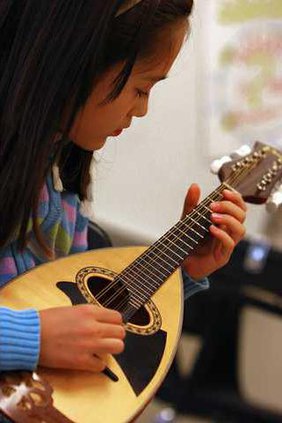A new after-school program will have students pickin’, hummin’ and singing along to traditional Appalachian music in North Georgia.
The Georgia Pick and Bow Traditional Music School, a partnership between Lumpkin County Board of Education and North Georgia College & State University, has launched a music program that began this fall for fourth- through 12th-graders to continue the tradition of Appalachian music.
"(The school) is an opportunity for multiple generations to work together to contribute to cultural preservation of local roots music," said Alice Sampson, cofounder of the program and director of NGCSU Center for Appalachian Studies.
The music school, which has 31 students, meets on Thursday afternoons at Lumpkin County Middle School and seeks to offer affordable music lessons using traditional instruments like the banjo, fiddle, guitar, mandolin and upright bass.
Pick and Bow was formed when a group of residents joined their love of bluegrass music with their desire to do something positive in the community.
"By spreading this love of music, we hope to form bands to preserve this proud tradition," Sampson said. Inspiration for the program came from a similar program based in Whitesburg, Ky., called Appalshop, a multidisciplinary arts and education center which also teaches Appalachian-style music.
The students at Lumpkin County Middle in Dahlonega go through a 10-week session, meeting once a week with a professional instructor.
Students Charles Tritt, 14, and Winfred Dockery, 13, practice banjo together at the school.
"If I learn how to play it, I get to keep it (the banjo)," said Tritt, regarding a deal he made with his father.
Dockery, who first played guitar, added, "I am personally fascinated with every stringed instrument."
Geoff Hohwald, their banjo instructor, has taught for more than 40 years and is an author for the Watch and Learn video series that teaches stringed instruments.
Other Pick and Bow instructors include the owner and an employee of Dahlonega’s Vintage Music store and other music performers.
"It’s mainly about the music and seeing the culture passed on," said Everett Whatley, a local musician who plays banjo and guitar.
Whatley said he wanted to be active in the Dahlonega community, and after responding to an ad for help with the Appalachian Studies Center, he met Sampson at a jam session on the NGCSU campus.
"This is American roots music," said Whatley, who helps out wherever he is needed.
Other key players include the program’s onsite director Sarrah Ellen McDonald, a teacher for Lumpkin County’s alternative school. "Music is a huge part of my life," she said.
McDonald grew up singing and dancing in Cumming, and she performs locally with a group called Barefoot Creek. She also plays the fiddle, guitar and upright bass.
"(Music) has taken me places I never would have gone," McDonald said.
McDonald, along with other instructors at the school, isn’t teaching bluegrass music for the money. One third of the students are attending the school under scholarship for either tuition or use of an instrument. Regular tuition — $50 — costs far less than what lessons from such experienced professionals would normally cost, according to Sampson.
These professionals are underpaid for their time but are instructing because they are dedicated to passing on their love of the instruments, she said. The program strives to "reach kids who may not have these advantages normally," Sampson said.
"If a student does really well but does not own their instrument, something will be arranged. We would not want to take (the instrument) out of their hands."
But the school is getting help from companies like D’Addario, a string manufacturer, which sent a large case of strings to support Pick and Bow. The school is also sponsored by the International Bluegrass Music Association based in Nashville, Tenn.
"We want to see (the students) branch off and form their own little groups and perform for different communities or different events," McDonald said.
Added Sampson, "It is exciting to watch them play and fun to listen to the notes springing from their instruments, as they have from so many before them".

